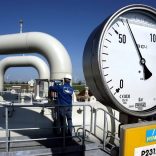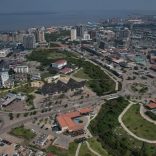Mozambique: Government provides information on LAM every 15 days - Watch
Mozambique: Business activity rises for third month running – Standard Bank PMI

File photo: Lusa
The PMI index of business activity in Mozambique rose in April, with business activity and sales growing for the third consecutive month, continuing to recover from post-election tension, according to Standard Bank, which conducts the survey.
“Growth was underpinned by an increase in sales, which helped to lift output and support a fresh rise in employment. Demand for inputs also led to the quickest increases in purchasing and inventories for nearly three years,” reads the April PMI report consulted by Lusa today.
Supply chains “registered a further recovery, whilst cost inflation remained relatively mild. As a result, businesses were more confident that activity growth will continue, with sentiment rising to its highest level since May 2024”, it reads.
“The PMI rose from 50.2 in March to 50.5 in April, posting above the 50.0 neutral mark for the third successive month,” the analysis reads. “The latest reading signalled a marginal uplift in operating conditions across the private sector in Mozambique,” it points out.
PMI indicators above 50 points point to an improvement in business conditions compared to the previous month, while indicators below this value show a deterioration.
Total output levels “rose for the third month running in April, albeit with the pace of expansion easing to the softest in this period”.
“New clients and rising sales were often associated with the upturn, as well as improved efficiency and efforts to increase the quality of products and services. A rise in demand encouraged firms to hire more staff,” the April PMI reads.
“Although the uplift in employment was the fastest seen in eight months, it was marginal and only partly offset a moderate reduction in March,” it adds.
Expectations for future output “likewise strengthened in April”, with 42% of the companies surveyed admitting that they expect “activity to rise over the year ahead, pushing the overall degree of optimism to an 11-month high.”
“Higher sales and product development were often highlighted as supporting forecasts. Another factor helping lift confidence was a gradual recovery of supply chains, following disruption in late-2024 and early this year amid post-election protests,” highlights the study.
The PMI indicator, published monthly by Standard Bank, is the result of responses from purchasing managers from a panel of around 400 private sector companies.
The PMI index recorded negative values between November 2024 and January 2025, a period of strong social unrest, with post-election demonstrations and widespread strikes in the country.
The document quotes Standard Bank’s chief economist, Fáusio Mussá as noting that, “for the first time since June 2024, all PMI sub-indices came in at the level of 50 or above”, which denotes “month-on month expansions in economic activity in March and implying that the private sector is still in recovery from the negative impact of the protests that followed the October 2024 election”.
“However, improved sentiment contrasts with increased global uncertainty and negative domestic developments, manifest in the IMF 3-year programme being suspended in April and the US cutting development assistance. This implies additional fiscal and foreign exchange liquidity pressures,” Mussá concludes.













Leave a Reply
Be the First to Comment!
You must be logged in to post a comment.
You must be logged in to post a comment.